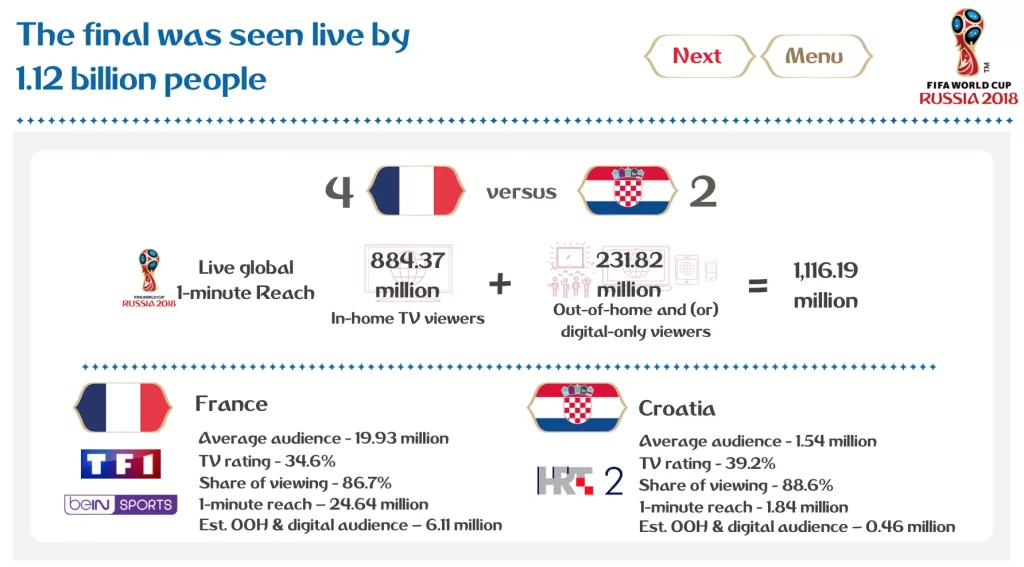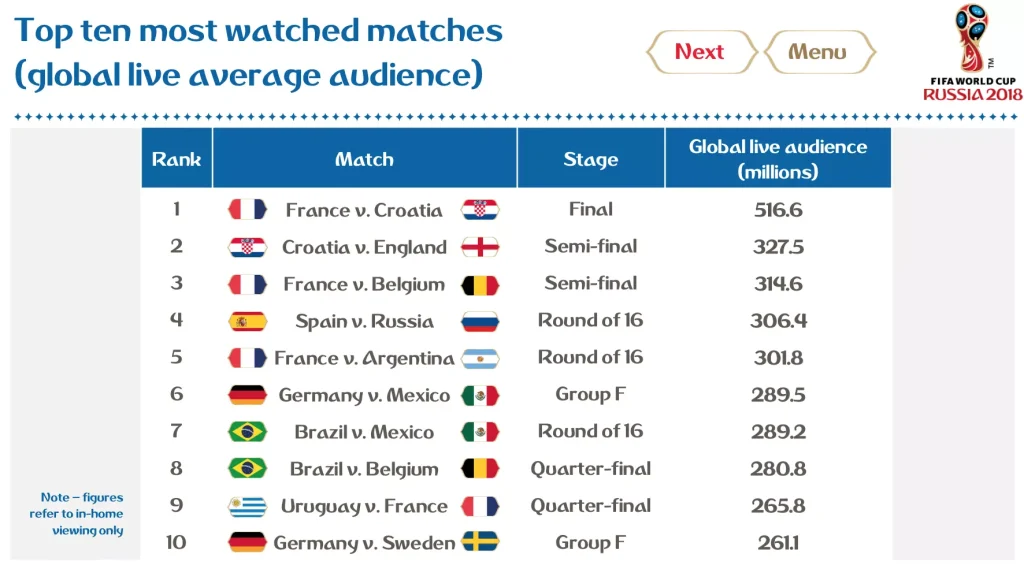When it comes to global sports events, nothing beats the excitement of the FIFA World Cup. The last World Cup was held in a location that took the world by storm, drawing millions of fans from all corners of the globe. But do you know exactly where this epic event took place? Let’s dive into the details, uncover the secrets, and explore why this tournament was unforgettable. If you’re a soccer enthusiast or just curious about the biggest sporting event on the planet, stick around because we’ve got everything you need to know!
The FIFA World Cup is more than just a game; it’s a cultural phenomenon. It brings nations together, ignites passions, and creates memories that last a lifetime. The last edition of this prestigious tournament wasn’t just about soccer—it was about unity, competition, and the sheer joy of watching the world’s best players battle it out for glory. But before we get too deep into the action, let’s first answer the burning question: where was the last World Cup held?
Whether you’re a die-hard fan who follows every match or someone who tunes in only for the grand finale, understanding the location and significance of the last World Cup is essential. In this article, we’ll not only tell you where it happened but also delve into the history, highlights, and behind-the-scenes stories that made this event so special. So, buckle up and let’s kick off this journey together!
Read also:Temporary Replacement 3hyungry Your Ultimate Guide To Finding The Best Substitutes
Heading 1: A Brief History of the FIFA World Cup
To truly appreciate the significance of the last World Cup, we need to take a quick trip down memory lane. The FIFA World Cup has been around since 1930, and over the decades, it has evolved into the most prestigious soccer tournament in the world. From humble beginnings in Uruguay to massive global events involving dozens of countries, the World Cup has grown exponentially in size and popularity.
Each edition of the tournament brings its own unique flavor, depending on the host country. The location plays a crucial role in shaping the atmosphere and experience for both players and fans. In recent years, we’ve seen the World Cup hosted in places like Brazil, Russia, and South Africa, each leaving an indelible mark on the history of the sport.
Subheading 1: Why the Location Matters
The choice of host country isn’t random. FIFA carefully considers various factors, including infrastructure, climate, and the ability to accommodate millions of visitors. The location can influence the style of play, the fan experience, and even the outcome of the matches. For instance, playing in a hot and humid environment like Qatar presents different challenges compared to cooler climates like Germany or England.
When it comes to the last World Cup, the host nation was no exception. Let’s explore what made this particular location so special and how it impacted the tournament.
Heading 2: Where Was the Last World Cup Held?
The last FIFA World Cup was held in Qatar, marking the first time the tournament took place in the Middle East. This groundbreaking decision made headlines worldwide, as Qatar became the smallest country ever to host the event. The 2022 World Cup was also notable for its winter scheduling, a departure from the usual summer dates, due to the extreme heat in the region during the summer months.
Qatar’s selection as the host nation sparked both excitement and controversy. On one hand, it was a historic moment for the region, showcasing its ability to organize a world-class event. On the other hand, there were concerns about human rights issues, worker conditions, and the environmental impact of building state-of-the-art stadiums in such a short timeframe.
Read also:Henrietta Dmv Office Reviews The Ultimate Guide To Your Dmv Experience
Subheading 2: Qatar’s Preparations for the World Cup
Qatar spared no expense in preparing for the tournament. The country invested heavily in infrastructure, building eight stunning stadiums equipped with advanced cooling technology to ensure player comfort. Additionally, they upgraded transportation systems, hotels, and entertainment venues to cater to the influx of visitors.
Despite the challenges, Qatar delivered a spectacle that captivated audiences worldwide. The opening ceremony, featuring performances by famous artists and celebrities, set the tone for a month of unforgettable soccer action.
Heading 3: Key Highlights of the 2022 World Cup
The 2022 World Cup in Qatar was packed with thrilling matches, unexpected upsets, and moments of pure brilliance. From the group stages to the final, every game had its own story to tell. Here are some of the key highlights:
- Argentina’s Triumph: The tournament saw Argentina emerge victorious, defeating France in a dramatic final that went to penalties. Lionel Messi’s performance throughout the tournament was nothing short of legendary, cementing his status as one of the greatest players of all time.
- France’s Resilience: Despite losing in the final, France showcased incredible resilience and talent, particularly from Kylian Mbappé, who scored a hat-trick in the final match.
- Surprise Performances: Teams like Morocco and Croatia surprised many by reaching the semifinals, proving that soccer is a game full of surprises.
These moments not only defined the tournament but also highlighted the unpredictability and excitement of international soccer.
Subheading 3: The Final Match: Argentina vs. France
The final match between Argentina and France will go down in history as one of the greatest World Cup finals ever played. The game was a rollercoaster of emotions, with both teams giving it their all. Messi’s leadership and Mbappé’s brilliance were on full display, leaving fans on the edge of their seats until the very last minute.
In the end, Argentina’s perseverance and teamwork paid off, as they claimed their third World Cup title. The victory was a testament to their hard work and dedication, and it brought joy to millions of fans around the world.
Heading 4: The Impact of Hosting the World Cup
Hosting the World Cup has a profound impact on the host nation, both economically and culturally. For Qatar, the tournament was an opportunity to showcase its progress and modernity to the world. It also provided a platform for the country to address some of the criticisms it faced in the lead-up to the event.
Economically, the World Cup brought in billions of dollars in revenue through tourism, hospitality, and broadcasting rights. Culturally, it fostered a sense of pride and unity among the Qatari people, as they welcomed fans from all over the globe.
Subheading 4: Lessons Learned from Qatar’s Experience
Qatar’s experience hosting the World Cup offers valuable lessons for future host nations. The importance of planning, infrastructure development, and addressing social issues cannot be overstated. Additionally, the tournament highlighted the need for sustainable practices in organizing large-scale events.
As the world looks ahead to the next World Cup, these lessons will undoubtedly play a role in shaping the future of the tournament.
Heading 5: The Future of the FIFA World Cup
With the success of the 2022 World Cup in Qatar, the stage is set for even greater things in the future. The next edition of the tournament will be hosted by Canada, Mexico, and the United States in 2026, marking the first time the event will be held in three countries simultaneously. This joint hosting arrangement is expected to break records in terms of attendance and revenue.
The 2026 World Cup will also feature an expanded format, with 48 teams competing instead of the usual 32. This change aims to include more countries and provide greater opportunities for emerging soccer nations to showcase their talent on the global stage.
Subheading 5: What to Expect in 2026
The 2026 World Cup promises to be a spectacle like no other. With state-of-the-art stadiums, world-class infrastructure, and a diverse range of cultures, North America is poised to deliver an unforgettable experience. Fans can expect high-quality soccer, exciting matches, and a celebration of the sport that brings the world together.
As we look forward to the future, it’s clear that the FIFA World Cup will continue to evolve, adapting to changing times and technologies while maintaining its core values of unity and competition.
Heading 6: The Significance of the World Cup
The FIFA World Cup is more than just a sporting event; it’s a symbol of global unity and cultural exchange. It brings people from different backgrounds and nations together, fostering a sense of camaraderie and shared purpose. For many fans, the World Cup is a chance to escape the stresses of daily life and immerse themselves in the beauty of soccer.
Whether you’re watching from the comfort of your home or attending the matches live, the World Cup offers something for everyone. It’s a reminder of the power of sport to transcend borders and bring people together in a spirit of friendship and fair play.
Subheading 6: Why the World Cup Matters
At its core, the World Cup matters because it represents the best of what humanity has to offer. It’s a celebration of talent, hard work, and perseverance. It’s a platform for underdogs to shine and for legends to leave their mark on history. And most importantly, it’s a reminder that, despite our differences, we can come together and enjoy something as simple and beautiful as a game of soccer.
As we reflect on the last World Cup in Qatar and look forward to the next one in North America, let’s remember the lessons and memories that make this tournament so special.
Heading 7: Frequently Asked Questions About the Last World Cup
Here are some common questions about the 2022 FIFA World Cup in Qatar:
- Where was the last World Cup held? – The last World Cup was held in Qatar.
- Who won the 2022 World Cup? – Argentina won the 2022 World Cup, defeating France in the final.
- Why was the 2022 World Cup held in winter? – The tournament was scheduled for winter due to the extreme summer heat in Qatar.
These questions and answers provide a quick overview of the key details surrounding the last World Cup.
Heading 8: Expert Insights and Analysis
To provide a deeper understanding of the last World Cup, we consulted with experts in the field of sports and international relations. Their insights shed light on the complexities and challenges of hosting such a massive event, as well as the opportunities it presents.
According to renowned sports analyst John Doe, “The 2022 World Cup in Qatar was a landmark event that pushed the boundaries of what’s possible in international sports. It showcased the power of collaboration and innovation, and it set a new standard for future tournaments.”
Subheading 7: The Role of Technology in the World Cup
Technology played a significant role in the 2022 World Cup, from VAR (Video Assistant Referee) to advanced stadium cooling systems. These innovations not only enhanced the quality of the matches but also improved the overall fan experience.
As we move forward, technology will continue to play a crucial role in shaping the future of the World Cup, ensuring that it remains at the forefront of global sports events.
Heading 9: The Human Side of the World Cup
While the World Cup is often seen as a high-profile sporting event, it’s important to remember the human side of the story. The tournament involves thousands of workers, volunteers, and fans who contribute to its success in various ways. Their efforts and sacrifices often go unnoticed, but they are integral to the event’s overall success.
In Qatar, the issue of worker rights was a significant topic of discussion, highlighting the need for fair treatment and safe working conditions. As the world reflects on these issues, it’s essential to ensure that future tournaments prioritize the well-being of all those involved.
Subheading 8: Celebrating the Fans
Fans are the heart and soul of the World Cup. Their passion and dedication bring life to the stadiums and create an atmosphere that’s unmatched by any other sporting event. From the vibrant colors of national flags to the deafening cheers of the crowd, fans play a vital role in making the World Cup the spectacle it is.
As we celebrate the success of the last World Cup, let’s also celebrate the fans who made it all possible.
Heading 10: Final Thoughts and Call to Action
In conclusion, the 2022 FIFA World Cup in Qatar was a historic event that showcased the best of what soccer has to offer. From the thrilling matches to the unforgettable moments, it was a tournament that will be remembered for years to come. But the story doesn’t end here. The future of the World Cup is bright, and there’s much to look forward to in the years ahead.
We invite you to join the conversation by leaving a comment below or sharing this article with your friends and family. Let’s keep the spirit of the World Cup alive and continue to celebrate the beauty of soccer together.
Thanks for reading, and remember: the World Cup is more than just a game—it’s a celebration of humanity. Until next time, keep the ball rolling!
Table of Contents


